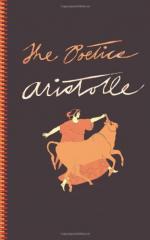
|
| Name: _________________________ | Period: ___________________ |
This quiz consists of 5 multiple choice and 5 short answer questions through Section III.
Multiple Choice Questions
1. In order for a plot to be truly effective in achieving the desired emotional response from its readers or audience, Aristotle says that the poet must do what?
(a) Pick characters that the audience can easily pity.
(b) Infuse irony throughout the story.
(c) Pick characters whose relationships to one another make the actions of the plot more interesting.
(d) Write a tragedy with a sad ending.
2. What is history according to Aristotle?
(a) Accounts that may or may not have happened.
(b) Concerned simply with facts.
(c) Rumors promoted as truth.
(d) Lies.
3. When, according to Aristotle, do some poets attempt to depict men or events as others have described them?
(a) When they strive to please the audience.
(b) They do not attempt to do this.
(c) When they re-tell a received legend or myth.
(d) When they lose their creative inspiration.
4. What type of story does Aristotle define as "episodic"?
(a) A particularly poor story.
(b) A great story.
(c) A dramatic story.
(d) A sad story.
5. Based on Aristotle's "Poetics", what does tragedy effectively achieve?
(a) The middle of poetry.
(b) The beginning of poetry.
(c) None of the answers is correct.
(d) The end of poetry.
Short Answer Questions
1. Aristotle asserts that the main character of a tragedy must have what?
2. Why does Aristotle believe that the main character of a tragedy ought to be a certain way?
3. In addition to a sign, what is the second kind of recognition as identified by Aristotle?
4. What does Aristotle say about what many writers do with history?
5. In a good tragedy, Aristotle explains that the misfortune the main character experiences is usually caused by what?
|
This section contains 342 words (approx. 2 pages at 300 words per page) |

|




